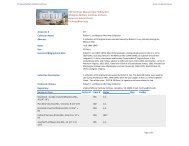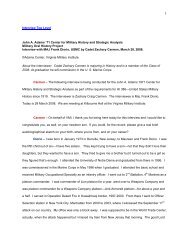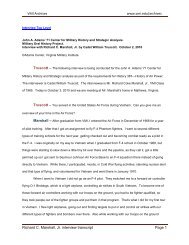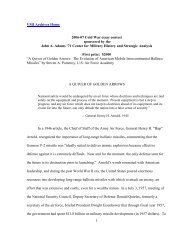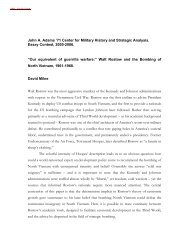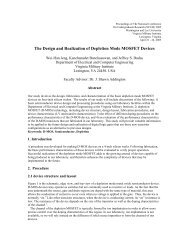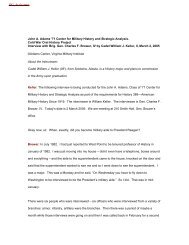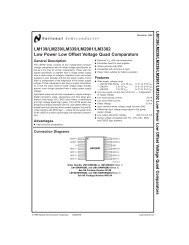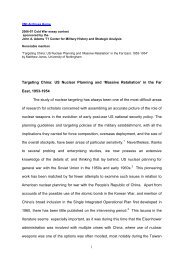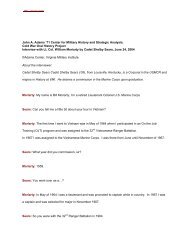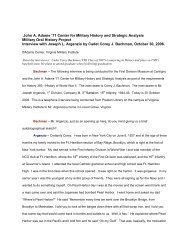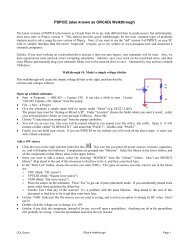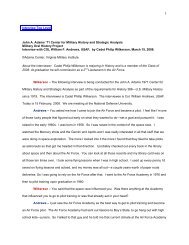Academic Catalog - Virginia Military Institute Admissions
Academic Catalog - Virginia Military Institute Admissions
Academic Catalog - Virginia Military Institute Admissions
Create successful ePaper yourself
Turn your PDF publications into a flip-book with our unique Google optimized e-Paper software.
mechanical engineering CURRICULUM<br />
Mechanical engineering is the second oldest of the<br />
engineering professions and has the largest enrollment of students<br />
in the United States. Mechanical engineering is a very broad<br />
field which includes many areas of study such as refrigeration,<br />
air conditioning, energy conversion, nuclear engineering,<br />
biomedical engineering, transportation equipment engineering<br />
and industrial engineering. Mechanical engineers are employed<br />
in design, operations, sales, energy conservation, research, and<br />
management. A mechanical engineering education is an excellent<br />
background for a career in the military, government, business, or<br />
other professions such as law and medicine.<br />
The mechanical engineering curriculum at VMI has two main<br />
branches: one branch consists of courses related to energy; the<br />
other branch has courses which are related to structures and<br />
motion in mechanical systems. The curriculum provides a broad<br />
background with courses in science, mathematics, liberal arts,<br />
and all of the engineering sciences. Extensive use is made of the<br />
computer facilities at VMI.<br />
The mission of the Mechanical Engineering Department<br />
is to prepare graduates for graduate studies, for a professional<br />
engineering career, or for a career in the military through a<br />
continually improving curriculum of courses in engineering,<br />
related sciences, mathematics, and humanities which will allow<br />
the student to possess:<br />
Educational Objective 1<br />
Enable the student to develop the ability to identify,<br />
formulate, and solve engineering problems in both the<br />
thermal/fluids, mechanical design and related areas.<br />
Supporting Program Outcomes:<br />
1.1 Graduates will have the ability to apply the knowledge of<br />
mathematics (through multivariate calculus and differential<br />
equations), science (through chemistry and calculus-based<br />
physics), and engineering to engineering problems in the<br />
thermal and mechanical design areas.<br />
1.2 Graduates will have the ability to analyze, and design mechanical<br />
and thermal systems, components and processes<br />
incorporating applicable engineering standards and realistic<br />
constraints.<br />
1.3 Graduates will have the ability to design and conduct experiments,<br />
and to analyze and interpret experimental results.<br />
1.4 Graduates will have the ability to use modern computational<br />
and analytical techniques, skills and tools.<br />
Educational Objective 2<br />
Enable the student to develop the professional skills and<br />
awareness necessary to responsibly practice engineering in<br />
a global and societal context.<br />
Supporting Program Outcomes:<br />
2.1 Graduates will have effective oral and written communication<br />
skills.<br />
2.2 Graduates will have the ability to effectively function on<br />
teams.<br />
2.3 Graduates will have an understanding of their professional<br />
and ethical responsibilities.<br />
2.4 Graduates will recognize their need of life-long learning and<br />
will possess the ability to engage in life-long learning.<br />
Laboratory facilities consist of: Computer-aided Design and<br />
Engineering Lab; Energy Lab; Computation Lab; Instrumentation<br />
Lab; Manufacturing and Robotics Lab; Materials Lab.<br />
Laboratories are designed as an extension of classroom work<br />
and provide technological experiments considered important<br />
to the engineering student. Cadets are provided practical<br />
hands-on experience on modern equipment. The department<br />
strongly emphasizes the use of computers for problem solving.<br />
A programming language is taught using microcomputers, and<br />
computer-aided drafting (CAD) is taught as a companion element<br />
in the drawing course. Both programming and CAD, as well as<br />
other computer applications, become an integral part of most<br />
courses taught in the department.<br />
The Mechanical Engineering Department has been in<br />
existence since 1941 as a service department to the other<br />
engineering departments. The new curriculum, started in 1982,<br />
produced its first graduates in May 1985 and is accredited by<br />
ABET, Inc.<br />
The department sponsors a student section of the ASME<br />
(American Society of Mechanical Engineers). Participation in<br />
professional activities is emphasized. Cadets are required to take<br />
the Fundamentals of Engineering (FE) examination as a graduation<br />
requirement during their first class year so that in the future they<br />
can become registered Professional Engineers.<br />
Honors in mechanical engineering<br />
1. Eligibility<br />
Each candidate must:<br />
A. Have an overall 3.00 quality point average in all classes<br />
(through the end of his/her 2nd class year).<br />
B. Have an overall 3.25 quality point average in all Mechanical<br />
Engineering classes (through the end of his/her 2nd class<br />
year).<br />
C. Have a 3.00 quality point average in all classes at<br />
graduation.<br />
D. Have a 3.25 quality point average in all Mechanical<br />
Engineering classes at graduation.<br />
2. Application and Administrative Procedures<br />
Each candidate must:<br />
A. Inform, in writing, the Department Head of their intention<br />
to participate in the Honors Program before the end of the<br />
cadet's second class year.<br />
B. Register for 2 semesters of the Independent Study sequence<br />
(ME 461-ME 462).<br />
C. Find a faculty adviser who is willing to supervise their<br />
Independent Study.<br />
D. Have the subject of their independent study approved by<br />
the Departmental Honors Committee prior to the beginning<br />
62




